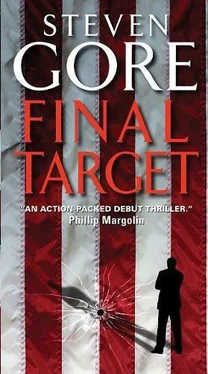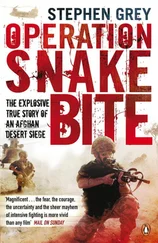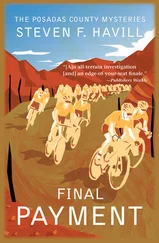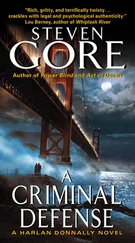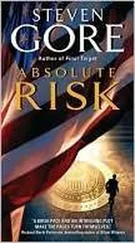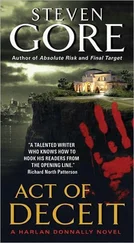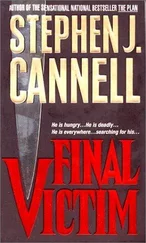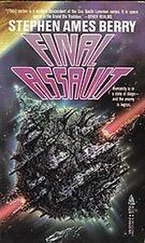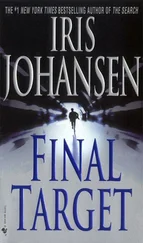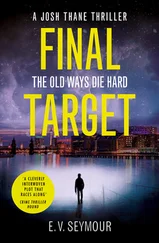Steven Gore - Final Target
Здесь есть возможность читать онлайн «Steven Gore - Final Target» весь текст электронной книги совершенно бесплатно (целиком полную версию без сокращений). В некоторых случаях можно слушать аудио, скачать через торрент в формате fb2 и присутствует краткое содержание. Жанр: Триллер, на английском языке. Описание произведения, (предисловие) а так же отзывы посетителей доступны на портале библиотеки ЛибКат.
- Название:Final Target
- Автор:
- Жанр:
- Год:неизвестен
- ISBN:нет данных
- Рейтинг книги:5 / 5. Голосов: 1
-
Избранное:Добавить в избранное
- Отзывы:
-
Ваша оценка:
- 100
- 1
- 2
- 3
- 4
- 5
Final Target: краткое содержание, описание и аннотация
Предлагаем к чтению аннотацию, описание, краткое содержание или предисловие (зависит от того, что написал сам автор книги «Final Target»). Если вы не нашли необходимую информацию о книге — напишите в комментариях, мы постараемся отыскать её.
Final Target — читать онлайн бесплатно полную книгу (весь текст) целиком
Ниже представлен текст книги, разбитый по страницам. Система сохранения места последней прочитанной страницы, позволяет с удобством читать онлайн бесплатно книгу «Final Target», без необходимости каждый раз заново искать на чём Вы остановились. Поставьте закладку, и сможете в любой момент перейти на страницу, на которой закончили чтение.
Интервал:
Закладка:
“And when the kid wants money?”
“Until the last few months he didn’t want money, he wanted things, big things. Now it’s all about cash on hand. If the opposition wins, they’ll try to take back all the factories he and the other oligarchs stole. There hasn’t been a privatization of a major steel works, truck factory, defense plant, farm, or electric generation facility that he doesn’t partly own through nominees or dummy companies. And it’s all at risk.”
Gage watched the passing traffic as he tried to fix in his mind the relationship between Hadeon Alexandervich and the president. “I was assuming the son was just a nominee for his dad.”
“Hadeon Alexandervich got some things on his own and some things he got because people thought they were paying off his father. Not that different than what the European press used to say about the second George Bush and his oil interests.”
“Assuming that Hadeon Alexandervich decides to buy what Matson is selling, he has either got to flip it quickly or take it with him when he flees the country.”
“My guess is that he’ll flip it,” Ninchenko said. “He needs assets that are liquid.”
Gage pointed down the street. “There’s 0087.”
They watched the government Mercedes pull to the curb in front of the hotel, followed by a dark green BMW 530i.
Matson and Alla stepped out the hotel entrance and waited at the top of the steps.
“It looks like the lovers’ quarrel isn’t over,” Gage said. “I saw her in London, a scowl is not her normal expression…I hope she’s not armed. I want Matson to live long enough to go to jail.”
“I better find out who owns the BMW,” Ninchenko said. He made a call, then read off the license number and waited.
“No such number is registered,” he reported a minute later. “It’s probably State Security.”
“Matson’s having a big day,” Gage said. “Sauna with the generals, fight with the girlfriend, protection by SBU.”
“And probably a meeting with Hadeon Alexandervich. That’s Gravilov’s Mercedes SUV pulling up. There are only a couple of G55s in Kiev. Everybody knows which one is his. It’s better armored than most banks in Ukraine.”
They watched Matson and Alla walk down the steps and enter Gravilov’s G55. The procession pulled away, speeding along Shevchenko Boulevard, skirting the main part of Kiev, then into the exclusive Pechersk District of wide boulevards and expensive apartments.
“Looks like the meeting is at Hadeon Alexandervich’s apartment,” Ninchenko said. “We’ll need to break this off when we get close. There’s too much security. Many government officials live in that building. Video cameras sweep all sides and the streets.”
“So it’s a black box?”
“Yes, a black box,” Ninchenko looked over at Gage. “How would it play out if they make a deal?”
“My guess is that Matson would give them at least one low-noise amplifier and one video amplifier to test. Then they’d have to negotiate a price. At some point he’d have to give up the software. And then the money would have to be moved.”
“So it will take a few days.”
“Probably,” Gage said. “Any chance of searching his hotel room?”
Ninchenko considered it for a moment, then shook his head. “Too risky.”
Gage fell silent as Ninchenko directed the driver to break off the chase. He felt a wave of frustration. He’d been reduced to a spectator, watching Matson travel from place to place, powerless to intervene, not even knowing how far along Matson was in the deal.
Then a moment of self-blame. He should’ve prevented Matson from leaving the U.S.-but maybe it wasn’t too late to backtrack. He reached for his cell phone and called Alex Z.
“Did you find out where FedEx delivered the MMIC chips?”
He heard Alex Z yawn before he answered. It was 4 A. M. in San Francisco.
“They dead-ended at a mail drop in Trenton, New Jersey. The receiving company is registered in Delaware, but is owned by a Florida corporation.”
Gage sent Alex Z back to bed, then disconnected. He had his answer about where the chips went: into a maze. And it would take a month of dead ends to get to the other side.
He was still a spectator.
CHAPTER 65
Ninchenko bumped Gage with his elbow as they drove toward the center of Kiev, then pointed up at the building housing the Cabinet of Ministers, a stucco monstrosity resting on granite blocks.
“That,” Ninchenko said, “along with most of Kiev, was leveled by the Nazis during the Great Patriotic War.” He gestured toward the building as they passed by. “The government kept German prisoners for two years after the war was over to rebuild it. As slave laborers. Some of them were just twelve-and thirteen-year-old children forced into the army by the Nazis in the last days of the war.” Gage heard regret in Ninchenko’s voice, as if it was a crime he had failed to prevent. “And not all of them survived.” He shook his head. “I hate even to look at it.”
Instead of turning west toward Independence Square and the apartment, the driver continued north, up a long, curving cobblestone street past the National Philharmonic, a yellow brick building looking to Gage more like a place of commerce than culture. They crested the hill and looked down at the blue Dnepr River and the four-story cruise ships moored for the winter at the Podil embankment terminal.
Gage didn’t mind the ride. He needed to think, and preferred to do it outside the confinement of the apartment.
Ninchenko’s driver wound his way up Castle Hill, then pulled into a space near the Orthodox church at the top. The few trees surrounding the small structure were bare and the parking lot was empty.
“Let’s get out here,” Ninchenko said. “I want to show you something.”
Gage followed Ninchenko to a low wall overlooking the city.
“This is where Kiev was founded,” Ninchenko said. “Not by the tribes living in the area, but by Lithuanian invaders. Ukraine, the word, means nothing more than ‘borderland.’ A gap, a void, an emptiness. One that is usually filled by others.”
A sharp gust blew up from the river. Gage turned up his collar and pulled down on his ushanka to cover the tops of his ears. Ninchenko shivered, then did the same.
“You don’t seem to be particularly proud to be Ukrainian,” Gage said.
“Ukraine is the product of hundreds of years of madness. It’s the Blanche DuBois of Europe, relying always on the kindness of strangers. Strangers gave Ukraine its capital, its industry, its culture, its religion. Russian was even the national language until a few years ago. And the world subconsciously recognizes it. Most people in the West think Kiev is part of Russia. They even refer to it as ‘The Ukraine,’ as if it was merely a region and not a nation.”
“I don’t want to offend you,” Gage said, “but there does seem to be a certain hollowness in Ukraine. I feel it every time I come here. Americans expect a certain depth, maybe a certain weightiness, in this part of the world. Cossacks, plagues, famines, suffering. The kinds of things that create great art and literature.”
“All of that only taught narrow-minded self-interest,” Ninchenko said. “That’s why Ukraine will sell arms to anyone. In fact, ethnic cleansing in the Balkans wouldn’t have been quite so effective without the weapons supplied by Ukraine. Too many Ukrainians live like there’s no tomorrow, and they expect that no one else has the right to.”
Ninchenko pointed north. “You know what’s just up that way?” Gage’s gaze followed Ninchenko’s arm toward treed, rolling hills. “Chernobyl. One hundred kilometers. A wind in this direction would’ve brought radiation to Kiev in two hours. You know how long it took the government to warn the people of Kiev about the nuclear accident? Two weeks. And you know what the government sent to the contaminated people in the zone? Red wine and instructions to wash their floors. Five hundred thousand people were evacuated, but not until they were fully bathed in the fallout and condemned to death.”
Читать дальшеИнтервал:
Закладка:
Похожие книги на «Final Target»
Представляем Вашему вниманию похожие книги на «Final Target» списком для выбора. Мы отобрали схожую по названию и смыслу литературу в надежде предоставить читателям больше вариантов отыскать новые, интересные, ещё непрочитанные произведения.
Обсуждение, отзывы о книге «Final Target» и просто собственные мнения читателей. Оставьте ваши комментарии, напишите, что Вы думаете о произведении, его смысле или главных героях. Укажите что конкретно понравилось, а что нет, и почему Вы так считаете.
